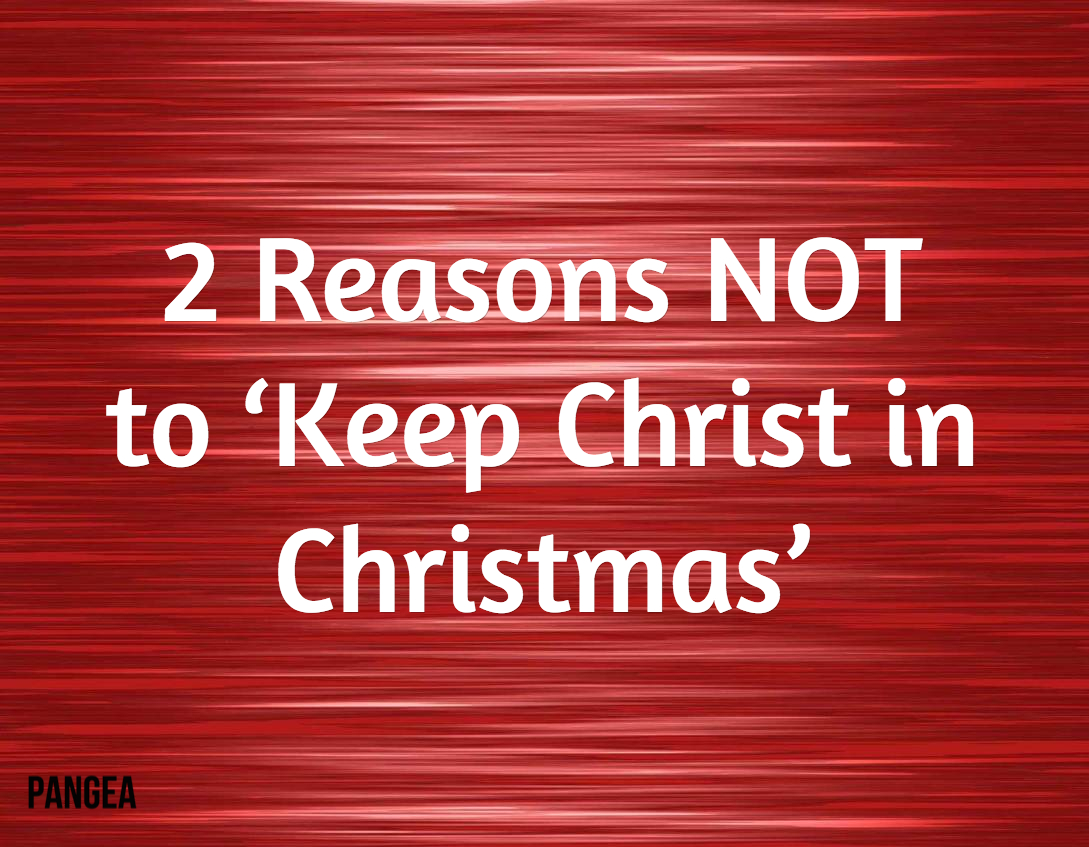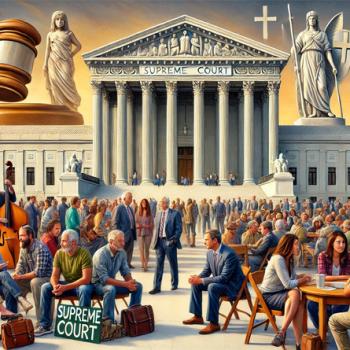*Guest Post: By Jeff K. Clarke
————————–
Keep Christ in Christmas is the slogan of choice for many Christians during this time of year. We see the phrase used all over the place – from Facebook posts, Twitter feeds and Instagram pictures, to Pinterest links and blog posts. However, while Keep Christ in Christmas is a good way for Jesus-followers to remember the season, the slogan should never be used as a means to force others to do so.
Here are 2 reasons why Christians should reconsider their traditional use of the slogan when we enter into the public sphere –
1 | It doesn’t faithfully reflect the character of Jesus and the humility of his birth.
Christmas is that time of year when we reflect on the moment in history when God came to earth in the person of Jesus, assumed the fullness of human flesh, was born in a barn, accompanied only by his parents, surrounded by barn animals, a few shepherds and sages from the East.
It was a simple night.
No pomp, ceremony, parties, celebrations or any of the activities that would normally accompany the birth of a king.
The night was steeped in humility.
Except for one star in the sky that only a few people even recognized, no one noticed.
Calm. Quiet. Peaceful.
No trumpets to herald the birth of a King. Just crying. Mary crying out in childbirth and Jesus as he was born.
By all accounts, it was a very uneventful evening.
That Was Then, This is Now
However, when we post on Facebook, Twitter or Instagram our demand for people to Keep Christ in Christmas, we are in that moment displaying a degree of arrogance, not humility.
Instead of pointing people to the humble birth of the incarnate God, we point out how angry we are that people have forgotten the reason for the season.
Through a variety of ways and means, we sometimes use power and ridicule in our attempts to force people to recognize Jesus, rather than take up Jesus’ weapons of choice – powerlessness and respect.
Before we paste the latest poster on Facebook that seeks to force Christ unto our friends, please take a moment to stop, reflect and consider other options.
Let’s try another approach. One that invites people to reconsider the story that started it all.
A story of a loving King who chose humility, weakness, love and peace as his weapons, rather than power and domination.
Jesus’ birth story is a beautiful one. A humble beginning that captures our imagination and heart. Let us therefore imitate his example and demonstrate a posture of humility as we invite others to embrace the central character the story points to. The character of a loving, unassuming baby.
2 | Christmas is a significant date in the Church’s liturgical calendar, not society’s calendar.
Advent and Christmas mark significant moments in the Church’s calendar. We take this time of year to stop, ponder, and anticipate the coming of Jesus, God’s Son, to earth. We mark the season by remembering God’s promise of a Messiah, the One who would inaugurate a new kingdom built on love, salvation, peace and hope.
For me, Christmas is all about Jesus’ incarnation – a powerful story of weakness and beauty. Its intrinsic humility causes me to humbly approach the story with gratitude and servitude.
However, so many Christians see this time of year as an opportunity to force the Church’s calendar into the calendar of the world.
Round peg, square hole.
Trying to force the message of Jesus’ birth into the pattern of the world is an exercise in futility. We will use enormous amounts of energy, time and resources attempting to do something that will never work.
Round peg, square hole.
Force will never further the message of Jesus. If God didn’t employ such means, why do we?
The empire of the world may have hijacked the season with consumerism, greed and the relentless pursuit of goods, using Christmas as an opportunity to buy and sale, but trying to force culture to respect our holiday (so to speak) will yield minimal results. And, if we see any results at all, they will be based in fear and guilt, not love, awe and peace.
Jesus didn’t enter the world through force and we should never think we can enter the world with his message through this means either.
Advent and Christmas is the Church’s time to reflect, ponder and anticipate the King’s arrival, as we wait for his return. And, we should point people to the story and invite them to experience it for themselves. However, the means we use to do so should echo the means God used – humility, invitation and embrace.
If we believe the Church and State are one and the same; that our nations are Christian and that governments should seek for ways to force culture to observe the Church’s calendar through law and legislation, we are so wrong.
Faith should always retain a separate identity from the State. And, when we try to enforce faith through law, we struggle to look like the Kingdom Jesus launched.
Jesus entered the world through the humility of a normal birth, in a barn, surrounded by animals. And, the Church must look for ways to imitate his posture when we enter the world with his message.
When we enter our world, a world in many ways similar to the time of Jesus, we must do so in humility. We need to humbly point people to his birth and what his birth points to, but we should never employ means that reflect the State more than Jesus.
Choosing a Better Way
Keep Christ in Christmas is a good way for Jesus-followers to remember the season, but the slogan should never be used as a means to force others to do so.
No one has ever become a follower of Jesus through force.
There will always be a better way – a loving, humble, gracious invitation that points people to the redemptive story of Jesus. A story that entered the world through a peaceful and unassuming means.
An ordinary story that showcases an extraordinary gift.
_________________________________________
Jeff K. Clarke is a blogger and an award-winning author of articles and book reviews in variety of faith-based publications. He blogs regularly at www.jeffkclarke.com – creating space to ask questions, stimulate conversation and inspire faith. He is on Twitter and Facebook.

















